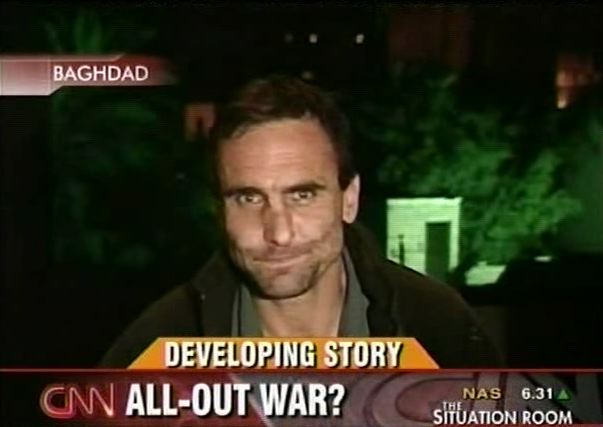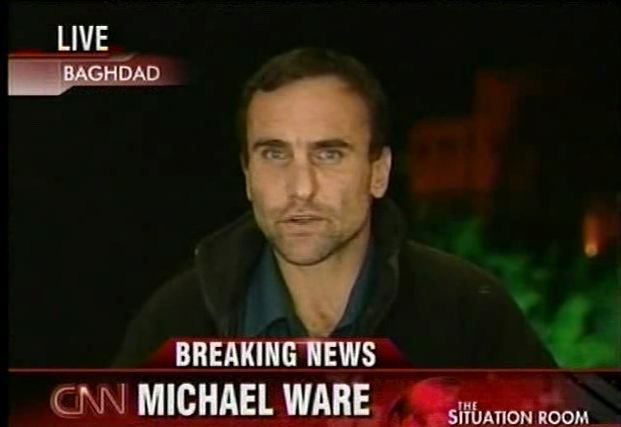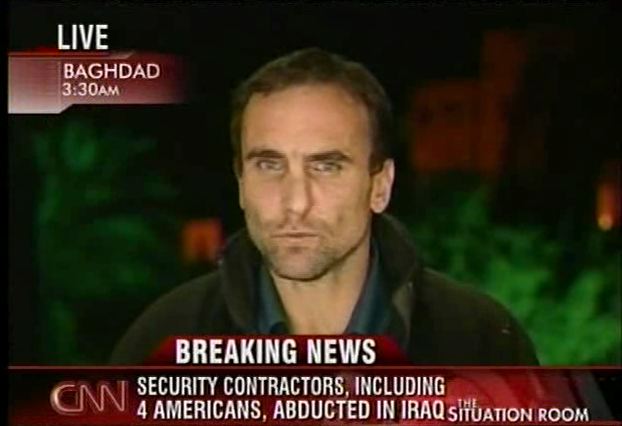TSR: Arrest warrant issued; Americans abducted

Click photo to play
Length: 3:58
WOLF BLITZER: Even as the Bush administration reviews its war strategy and Congress debates ways to bring troops home, there is now word that more Americans are being sent to Iraq to battle insurgents.
But is the Iraq conflict about to blow up into all out civil war?
We begin with a stunning new development.
Joining us now from Baghdad, our correspondent, Michael Ware. Michael, CNN has now confirmed that the Iraqi Minister of Interior has issued an arrest warrant for the leader of the influential Sunni Association of Muslim Scholars, a man by the name of Harith al-Dhari, who is believed to be in Jordan right now.
Given the tensions that already exist between Shia and Sunni, give us some perspective on what this means.
MICHAEL WARE, CNN CORRESPONDENT: Well, Wolf, such an arrest warrant, if it's pursued or even if it denies Harith al-Dhari from returning to Iraq, could be potentially explosive. I mean, Harith al-Dhari is one of the leading lights, one of the leading figures for the Sunni community here in Iraq.
And remember, it's the Sunnis who are the backbone of the insurgency. And while Harith al-Dhari and his peak organization, the Association of Muslim Scholars, may not speak for every Sunni, it's still the leading organization that carries the Sunni voice.
And it's certainly going to be seen within that community as a direct attack not just on this organization, but on their entire community. It's going to be viewed as a signal of intent by this Shia-led government. This really could spell trouble -- Wolf.
BLITZER: This is of the equivalent -- correct me if I'm wrong -- if the government decided to issue an arrest warrant for Muqtada al-Sadr, who's a radical Shiite cleric, that would cause enormous ramifications in the Shia community. To do this to this Sunni leader is very provocative.
WARE: Absolutely. And I mean we need to bear in mind, as well, that there has been an arrest warrant hanging over Shia militant cleric Muqtada al-Sadr for several years now. That relates to the assassination of a rival cleric in southern Iraq in 2003.
Now, eventually the investigative trial led back to Muqtada. A warrant was issued.
Now, U.S. forces have not enacted that warrant, leaving it to the Iraqi government, which still has done nothing about it. If it now turns around and the Minister of Interior, dominated by another Shia militia, issues a warrant against such an important Sunni leader and then pursues it or effectively forces him into exile, this will be a rallying cry for Sunnis generally. It'll inflame the insurgency.
BLITZER: And I assume it will inflame the Sunnis to the point that it will make the status, the situation of American troops in Iraq even more vulnerable.
WARE: Oh, for sure. I mean this feeds into a very complicated dynamic that has American troops caught in the middle of what is, let's be frank about it, a civil war. And this is just another act in that sectarian conflict that we're seeing.
I mean, and U.S. troops here, stuck between these two warring parties, now, if the Sunnis are inflamed by this, they will be trying to direct their attacks against this Shia-led government.
But don't forget, to the Sunni mind, U.S. forces are just as legitimate a target.
Why?
Because this is a U.S.-backed government. To the Sunnis and the Sunni insurgents, America brought this democratic model that delivered power to the Iraqi Shias and to their mind, Iran. And here they are trying to arrest a major Sunni leader.
BLITZER: Michael Ware reporting for us from Baghdad.
Thanks.
WARE: Thank you, Wolf.

Click photo to play
Length: 7:07
WOLF BLITZER: We begin with breaking news we're following out of Iraq. The U.S. military saying a number of security contractors, including four Americans have now been abducted following the ambush of a supply convoy. The attack took place in southern Iraq near Nasariya. Our Michael Ware is standing by in Baghdad, but let's turn and go to the Pentagon, our senior Pentagon correspondent Jamie McIntyre for the latest developments. What do we know right now, Jamie?
JAMIE MCINTYRE, CNN SR. PENTAGON CORRESPONDENT: Wolf, officially the U.S. military is saying very little about this except that there was an incident, they're calling it, near Nasariya involving a convoy. That's all they'll say for the record while they say they are gathering information and about to put out some sort of release.
Unofficially a U.S. military official confirms to CNN that as a result of this incident or attack, that a number of people were abducted by unknown assailants, including, it is believed, four U.S. contractors who are working as part of this supply convoy. It is not known who was responsible for the abduction, although it took place in or near Nasariya in the southern part of Iraq, a largely Shia area. But again, the U.S. military insists that it's still gathering information. They did confirm, however, that a search is under way for those missing American contractors -- Wolf.
BLITZER: Stand by, Jamie. I want to come back to you. Michael Ware is our man in Baghdad. You're checking this story out as well. What are you hearing in Baghdad, Michael?
MICHAEL WARE, CNN CORRESPONDENT: Well, Wolf, obviously it's very difficult. It's 3:00 a.m. here. And the city is under curfew like the rest of the country. But I've just spoken to some of the British forces in the south. They confirm that an incident has taken place. However, they say that it did not involve any British military or British civilians. Nonetheless, we have been told here in the capital that as many as four American contractors may be missing. So it's confirmed that it's in the area of Nasariya and clearly, there's a lot yet to come -- Wolf.
BLITZER: What we're hearing also, Jamie and Michael, let me pick it up with Michael first, that this is one of these regular convoys. There's an enormous amount of traffic, ground traffic going in from northern Kuwait where they stage -- I was there last year and watched how they do this -- usually 30 or 40 trucks. They drive on that 400-mile road toward Baghdad and beyond, usually under pretty heavy security right now. Certainly it's a very dangerous drive from Kuwait up to Baghdad. But, Michael, I'm sure you've been on that road many times. These contractors, these truck drivers, the U.S. military who go along with them, they're doing it all the time.
WARE: Absolutely. Generally what we see is a certain company will have a contract to provide food or other services to the U.S. military or coalition forces. They will then contract a security firm to protect their facilities and their convoys. It seems to be that this is the type of convoy that we're talking about. So it has a private security firm that is providing the protection.
Now what we understand is, it was traveling towards one of the major bases in or around Nasariya. Nasariya, there is certainly one American logistics facility that is very significant and deals with a lot of the supplies that come into the country for coalition forces. So there's a lot of regular traffic. We also know that in this province, around this area, there has been some tension with the coalition forces, the Brits who are in control of that area.
And the governor of that province has requested or insisted that British forces do not patrol the area and restrict themselves to the protection of these logistics bases. This is an area that is controlled by Shia militias. Some of which U.S. intelligence claims are backed by Iran. This is not a Sunni area and this is unlikely to be the work of Sunni insurgents -- Wolf.
BLITZER: Jamie McIntyre, this coming on a day where the U.S. military announcing that 2,200 more United States Marines are about to be deployed to the Anbar Province, that huge province in Western Iraq. What's going on on that front?
MCINTYRE: Well, again, a day after General John Abizaid made a pretty spirited argument that additional U.S. military forces really wouldn't make much difference in the long run, he also conceded that he had approved this dispatch of some 2,200 Marines, part of a force that had been held in reserve on ships to the al Anbar Province to assist the 20,000 Marines already there. This is an area where admittedly all U.S. commanders admit they do not have control of al Anbar Province, which is a Sunni insurgent stronghold.
But just to come back to the point that Michael Ware made, this abduction that took place in the south of Iraq is an area that's controlled by Shia militias. And coming after a day when we saw this mass kidnapping in Baghdad, which was carried out by people who appeared to be dressed as Iraqi police, it raises the questions about whether there could have been any Shia militia involvement in this incident in the south. And again I just want to stress the U.S. military says it is still gathering information about precisely what happened, even as they've already launched a search to try to see if they can find the missing people.
BLITZER: And Michael, even as the tension level in Iraq is sky high right now, potentially it could get a whole lot worse in the coming days with word now that the Iraqi Interior Ministry has issued a warrant for the arrest of a top Iraqi Sunni leader. What's going on, on that front?
WARE: Well, what we know is that this evening the Ministry of Interior announced that it issued this arrest warrant for this leading Sunni cleric. Now he may not speak for all Sunnis in Iraq, but certainly most of that community will see this as an attack on them more broadly. Now what generally is happening is that we're seeing this predominantly Shia-led government -- and this is a government that has buried deep within it many, many of these militia elements -- we're seeing it going on the offensive.
It clearly thinks, elements within this government, that now is the time, during this period of strategic uncertainty in the U.S. following the midterm elections, there is a U.S. soldier missing who was, according to the U.S. military, abducted in the lead-up to the midterms. Now U.S. military intelligence sources say all investigative channels point to a Shia militia. Now we're seeing this in the south, in a Shia militia controlled area. It certainly begs a lot of questions about what's going on strategically here -- Wolf.
BLITZER: All right, we're going to have both of you stand by, Jamie and Michael. Both stand by. We're following the breaking news.

Click photo to play
Length: 3:21
WOLF BLITZER: Back now to our breaking news story -- an ambush of security contractors in southern Iraq. The U.S. military saying four Americans are among those abducted after the attack. Our Michael Ware is in Baghdad. Jamie McIntyre is over at the Pentagon.
Michael, this kind of situation, we don't hear about a lot of Americans being kidnapped or captured, at least recently, in Iraq. I assume that's because security precautions have really been beefed up.
WARE: That's part of the reason, Wolf. There definitely has been an increase in the protection of MSRs, or main supply routes. There's also been beefing up of convoy protection, in terms of anti-IED technology, more armor -- and this is both civilian contractors and security teams and U.S. and coalition military teams.
So, yes, this has very much been a part of doing business here in Iraq. We've seen contractors hauled from their trucks or hauled from their vehicles in the past, including at least one American. And what we're hearing now is that perhaps this incident now involves four Americans. And there's unconfirmed reports from coalition sources that there may be a fifth missing person as well, a European.
Now this is in an area, a province that was handed over to Iraqi control just in September. So technically, the British, Australian and Italian forces and Americans there protecting significant logistics bases do not patrol the province itself. They're not responsible for security in that region. That's left to the Iraqis.
But this is in a very heavily militia -- Shia militia dominated area. So something like this could not take place without the involvement of some kind of paramilitary organization down in this area, one would have to speculate -- Wolf.
BLITZER: And Jamie, if, in fact, these Shia militia, the death squads are putting on Iraqi Army uniforms and creating what seem to be normal Iraqi military checkpoints, how is the U.S. military -- what are they telling you? How are they dealing with this real threat to U.S. forces trying to determine who's friendly -- who's a friend and who's a foe?
JAMIE MCINTYRE, CNN PENTAGON CORRESPONDENT: Well, first of all, they're still trying to figure out what happened in this particular incident. And you know from your days as a Pentagon correspondent, that they always urge you to be cautious about the initial reports. In fact, we're now being told it's not clear that U.S. forces are participating in a search. It may, in fact, be British forces along with Iraqi security forces, as Michael Ware pointed out, who are actually trying to sort out what happened.
Just to backtrack slightly, it appears that this was a civilian convoy coming out of Kuwait of about 19 vehicles, according to a Pentagon spokesman, and that it resulted in as many as 14 people being abducted, including those four Americans who work for this Kuwaiti-based contractor.
But at this point, they're still trying to sort out exactly what happened, and whether or not there was any subterfuge involved in the form of somebody dressing up as Iraqi security forces.
BLITZER: Jamie McIntyre, Michael Ware, thanks to both of you.
